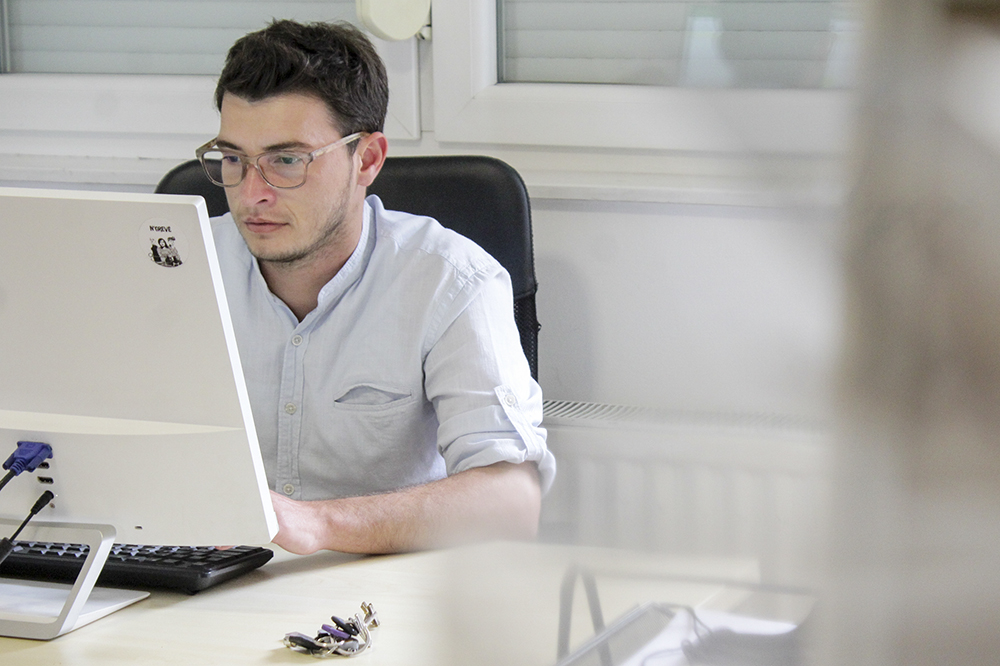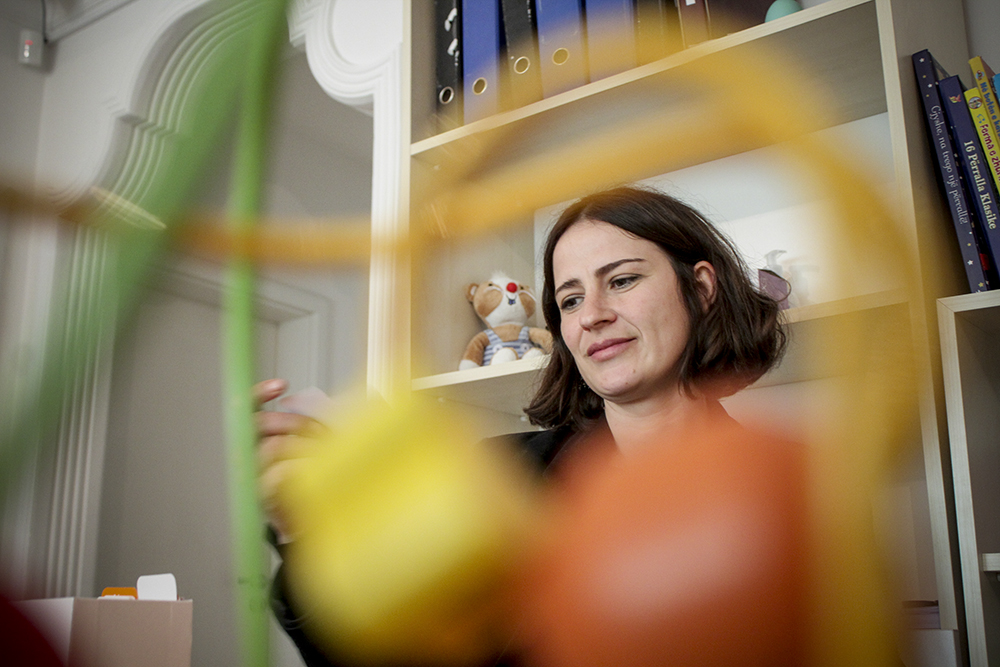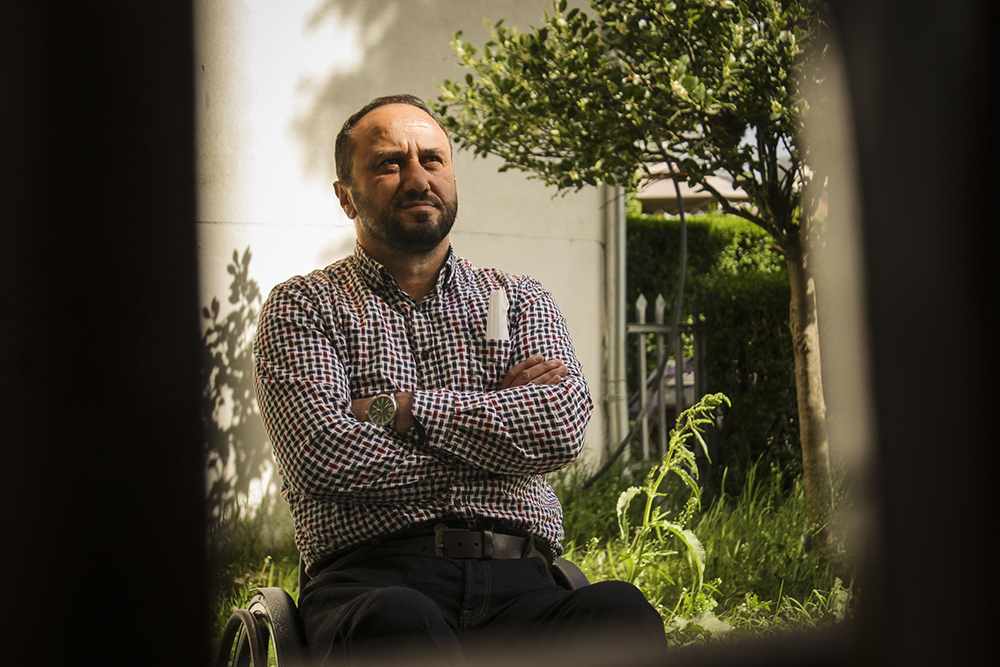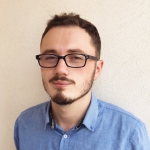In December 2019, the Basic Court in Prishtina affirmed Blert Morina’s right to change his name and gender marker on his identification documents, marking an important moment for Blert, transgender people and the entire LGBTQ movement in Kosovo.
With the verdict on his side, he went to the Municipality of Gjakova in January last year to formally request new documents. This was the very institution that rejected his request to change his name from “Blerta” to “Blert,” and the gender marker from F (Female) to M (Male), prompting continuous court battles for almost two years.
As he was struggling with the state, he was also going through hormone therapy as part of his planned transition that he had started before 2018, the year he submitted the request to change his name and gender marker at the Office of Civil Registration in Gjakova, his hometown. When he received the new papers two years later, masculine features were already evident in his appearance – hormone therapy had manifested itself in facial and arm hair, as well as a deeper voice.
But despite his victory over the state and his successful transition, a lack of social and health services are affecting Morina and other individuals from socially marginalized communities forcing them to confront additional challenges and difficulties.
Complications in transition
From the first confirmation of infected cases, it soon became clear that the COVID-19 pandemic was deepening inequalities through the neglect, in particular, of people who already encounter systemic institutional discrimination. For example, hormone therapy, which for some transgender people is crucial during their transition, has never been considered by local institutions as sufficiently important.
"All the progress you have made during the transition is brought back to square one."
Blert Morina
Morina said that because therapy for transgender people has never been available in Kosovo, he and others have been forced to seek solutions in neighboring countries. Due to its proximity, he started hormone therapy in Skopje, the capital of North Macedonia.
But when lockdown measures were imposed in March 2020 to prevent the spread of COVID-19, Morina was forced to pause his hormone therapy for the three months that the border closure measures were in place. He thinks the pandemic has made it clearer than ever that local health institutions must provide hormone therapy services.
“The problem is not that you are stopping a therapy, but that this therapy affects your physical health. You cannot start this therapy and then interrupt it, as it must continue for life,” he said. “The consequences of stopping therapy can be very significant.”

Blert Morina says hormonal therapy for transgender people must be made available at public hospitals. Photo: Agan Kosumi / K2.0.
Morina explains that each round of hormone therapy is prescribed every three months, after preliminary tests and consultation with an endocrinologist. Adjustments to the prescription are made depending on the patient’s body and emotional state.
“There have been some who have risked things and taken [doses during isolation], even without a prescription, which is very dangerous,” said Morina. Others have paused their therapy, which can also be harmful.
“All the progress you have made during the transition is brought back to square one,” he said. “Even this for the body is a kind of shock, every time you make changes.”
The complications of receiving hormone therapy abroad have led LGBTQ rights activists to repeatedly insist that such services be provided in public hospitals. Morina noted that greater health care protection would also replace expensive services in private hospitals, which for many transgender people remain unaffordable.
At the mercy of associations
The COVID-19 pandemic has caused considerable fear and uncertainty as it has negatively affected almost all aspects of society. This has resulted in almost universal hardship and stress. Like transgender people, and the broader LGBTQ community, it is precisely individuals in vulnerable positions who have been most affected by isolation, stay-at-home orders, closure of essential services and social distancing measures.
"The work becomes challenging when you meet parents for the first time, without meeting and observing the child directly."
Jeta Deva, psychologist
A mother of a 12-year-old with autism, who is assisted by the National Autism Association of Kosovo (ANAK), says the pandemic has made it challenging for her son to receive the right services.
“Getting services in person is not the same as getting them online,” said the woman, who did not want to be identified. “It has been three months since the child did not go to the center, even though the center has expressed its readiness and the center’s therapists have been in constant contact with us, trying not to take steps backwards.”
Jeta Deva, director and founder of ANAK, says that the association’s staff have all been working under constant stress, especially during periods when the virus was spreading faster.
“The nature of working with children is such that… you keep the mask on but in some moments you remove it because you have to deal with pronunciation,” she said. “Then a lot of assessments have been postponed. You often meet colleagues online, but the work becomes challenging when you meet parents for the first time, without meeting and observing the child directly.”
Deva explained how children with autism are treated with scientific therapy, such as behavioral therapy, which helps the children develop skills and behaviors that aid with learning and communication.

Psychologist and director of the National Autism Association of Kosovo Jeta Deva says that services for autistic people need to be facilitated by the state. Photo: Agan Kosumi / K2.0.
She said that these services are an essential bridge that prepares children to go to school, particularly as those who don’t receive them before starting kindergarten face difficulties with communication, socialization and repetitive behaviors. In the absence of financial support from the state, ANAK and other autism organizations in Kosovo find it difficult to afford the multidisciplinary teams – pediatrician, psychologist, speech therapist, psychiatrist – that should be present in sessions with children.
“This is very difficult because they have to take on the role of two or three professionals,” she said.
In fact, parents of children with autism have consistently highlighted the difficulties they face with the expenses, which can amount to several hundred euros per month. Some of these expenses include medication and sessions with psychologists and school assistants.
The mother of the 12-year-old boy confirmed this.
“The psychological services that our son receives, the assisting teacher, it is costly. We pay for everything,” she said. “It is an unaffordable amount for the family income, because only one of us provides it, only my husband works. It’s unaffordable because it’s something long-term, not something short-term.”
Meanwhile, various studies and reports have highlighted that children and adults with autism across the globe faced inequalities even before the pandemic. In the last year they are facing increased risks of discrimination and limited access to existing services and support.
The pandemic has also impoverished many families in Kosovo, but there has not yet been an assessment of how much unemployment has affected parents of children with autism.
Left without health care services
Afrim Maliqi, a disability rights activist since the 1990s, has long been a witness to how institutions fail the well-being of people with disabilities. He does not have high expectations that policies will address this sector of society.
"These are some of the standards that the state is responsible for, and not the associations."
Afrim Maliqi, director of Handikos
Maliqi is the director of Handikos, the Kosovo Association of Paraplegics and Paralyzed Children, an organization that began providing services before the war.
“The war ended, then in December 2001 the emergency ended, and we thought that the institutions would take responsibility, but in reality they have not taken it yet,” he said. “I’m talking about the equipment [for people with disabilities] that we offer. No institution has [yet] provided [them], despite the fact that we have provided equipment to our institutions, namely the Ministry of Health, [University Clinical Center of Kosovo], Ministry of Labor and Social Welfare, which we provide in cooperation with international organizations with donations.”
Maliqi said that people with disabilities continue to lack access to professional services, assistive equipment, medications, school assistants and accessible transport infrastructure.
“These are some of the standards that the state is responsible for, and not the associations,” said Maliqi. “Handikos tries to help people with disabilities with some types of services, which we have piloted so far, but there are not enough of them and they are only on a project basis.”
The organization provides physical and psycho-social rehabilitation services as well as day care for children and adults.

Afrim Maliqi, director of Handikos, says that the organization he leads is doing the state’s job and provides equipment for various institutions. Photo: Agan Kosumi / K2.0.
“In this case, these are only called social services, not medical services… compared to countries in the region or even in the West, where there is a multisectoral approach,” he said. “Teams work with different medical rehabilitation profiles to make the person independent in their daily activities.”
Maliqi added that the pandemic has prevented the in-person provision of services, and that this has worsened the situation for people with disabilities. In addition, many individuals with disabilities have had to accompany family members to family medicine centers or other clinics for health services, which has raised fears of greater exposure to the virus.
But unlike other groups who even during the pandemic are being discriminated against by the system that should support them, people with disabilities were included in the government’s emergency assistance package in March 2020. The government also included beneficiaries of pension schemes that receive less than 100 euros on a monthly basis, including beneficiaries of pensions for people with disabilities. The government allocated an additional 30 euros for three consecutive months.
Nevertheless, reports from universities around the world suggest that people with disabilities have faced isolation and exclusion from social and health services. This is a sign of the need for research in every country to provide an accurate picture of the pandemic’s impact on people with disabilities.
Feature image: K2.0.


This publication was produced with the financial support of the European Union as part of the project “Citizens Engage”, implemented by K2.0 in partnership with GAP Institute. Its contents are the sole responsibility of Kosovo 2.0 and GAP Institute and do not necessarily reflect the views of the European Union.






